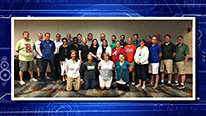- Sarah Dunton
- ECEP Alliance Director
- Expanding Computing Education Pathways & The National Center for Women & Information Technology
- https://ecepalliance.org/summit-toolkit
- ECEP Alliance, MA Green High Performance Computing Center
- Tim Faiella
- https://www.ncwit.org/profile/tim-faiella
- Social Science Program Manager
- Expanding Computing Education Pathways & The National Center for Women & Information Technology
- https://ecepalliance.org/summit-toolkit
- National Center for Women & Information Technology
- Carol Fletcher
- https://www.linkedin.com/in/carol-fletcher-20740511?trk=nav_responsive_tab_profile
- Deputy Director
- Expanding Computing Education Pathways & The National Center for Women & Information Technology
- https://ecepalliance.org/summit-toolkit
- University of Texas at Austin
- Megean Garvin
- Director of Research and Assessment
- Expanding Computing Education Pathways & The National Center for Women & Information Technology
- https://ecepalliance.org/summit-toolkit
- Maryland Center for Computing Education
- Mike Karlin
- https://www.linkedin.com/in/mike-karlin/
- Ph.D. Candidate & Research Assistant
- Expanding Computing Education Pathways & The National Center for Women & Information Technology
- https://ecepalliance.org/summit-toolkit
- Indiana University
- Anne Leftwich
- http://@anneleftwich
- Associate Professor
- Expanding Computing Education Pathways & The National Center for Women & Information Technology
- https://ecepalliance.org/summit-toolkit
- Indiana University, ECEP Alliance
- Dawn Morrison
- https://www.linkedin.com/in/dawn-morrison-5805a17/
- Education Administrator/ECEP (AL)
- Expanding Computing Education Pathways & The National Center for Women & Information Technology
- https://ecepalliance.org/summit-toolkit
- Alabama State Department of Education
- Deborah Seehorn
- NC ECEP State Lead
- Expanding Computing Education Pathways & The National Center for Women & Information Technology
- https://ecepalliance.org/summit-toolkit
- NC ECEP
- Rebecca Zarch
- Expanding Computing Education Pathways & The National Center for Women & Information Technology
- https://ecepalliance.org/summit-toolkit
- SageFox Consulting Group
Public
Choice
Choice
Public Discussion
Continue the discussion of this presentation on the Multiplex. Go to Multiplex















Sarah Dunton
ECEP Alliance Director
Two NSF-funded Broadening Participation in Computing Alliances, Expanding Computing Education Pathways (ECEP) Alliance and the National Center for Women & Information Technology (NCWIT), created the State Summit Toolkit to help leadership teams coordinate computer science education policy reform and advocacy efforts.
ECEP currently works with 22 states and the territory of Puerto Rico. The majority of ECEP states have held a summit or smaller convening of stakeholders to advance their state strategies to increase the number and diversity of students in K-16 computer science pathways. States have shared valuable lessons learned through hosting these summits, and this document is the culmination of their efforts.
Download the toolkit (attached in the column to the right) to access everything you need to launch your first meeting or a state-wide summit that will drive your broadening participation in computing strategies.
We look forward to talking with you about the toolkit and the CS education efforts in your state.
Anne Leftwich
Abby Funabiki
Carol Fletcher
Deputy Director
How do you engage advocates outside of K12 education to participate in a CS Summit? Share your ideas here
Sarah Dunton
Anne Leftwich
Anne Leftwich
Associate Professor
We have a great ally in Nextech, our regional Code.org partner. They have amazing connections across the state, and were heavily connected to SalesForce. Also, looking to Code.org's Director of State Government Affairs - Sean Roberts has been really helpful for us to connect outside of K-12.
Sarah Dunton
Rachel Adler
I will be at the NCWIT Summit this week and registered for your session to hear more about this. Sounds very interesting and I will bring along my questions Thursday on how we can get involved.
Megean Garvin
Anne Leftwich
Abby Funabiki
Sarah Dunton
Leigh DeLyser
Sarah Dunton
ECEP Alliance Director
Rachel thanks for your comment. It will be great to talk to you about this model in person at the NCWIT Summit. Feel free to still post your questions here, or we could post them during the workshop on Thursday.
Tim Faiella
Social Science Program Manager
We'll look forward to seeing you at the workshop, Rachel. And as Sarah said, please don't hesitate to ask questions here.
Thanks for taking the time to comment on our video!
Sarah Dunton
Abby Funabiki
Associate Executive Director
The ECEP state summit toolkit is such a great resource for states! I appreciate how specific and practical it is. A lot of us in the field may not know the nitty gritty of hosting a large event so the logistics and checklists are helpful!
Also, with the BPC stakeholder suggestions and other tools, there is no excuse not to have representative partners at the table.
What are you currently working on and what are your next steps?
Jared O'Leary
Sarah Dunton
Anne Leftwich
Leigh DeLyser
Anne Leftwich
Associate Professor
Thank you Abby!
One of our next great resources we are finalizing now is a How to Write a Landscape Report. We found this to be critical for our states to identify where they are currently at with Computer Science and how to move forward. It's important to be able to provide talking points and have back-up data to support your claims.
We already have several states that have completed these: https://ecepalliance.org/resources/landscape-re...
But hope to create some form of template that will make this process easier for states to complete.
Abby Funabiki
Sarah Dunton
Deborah Seehorn
NC ECEP State Lead
Hi, Abby. Thanks for your great comment! In North Carolina we have already had one statewide Computing Education Summit and a second summit in the western part of our state. The first summit was designed to share our landscape report and raise awareness of computing education within a diverse group of stakeholders. The Western NC Computing Summit was targeted at communities in the western part of the state and was designed to grow local leadership and support them in broadening participation in computing in their communities. Western NC has many rural communities, which have different opportunities and challenges than the communities near large cities. We hope to hold a summit in the eastern part of NC next--another region with many rural communities. We also have a steering committee working on K-12 CS Standards for the state, and have just recently welcomed a new NC Director of Computer Science and Technology Education.
Leigh DeLyser
Abby Funabiki
Sarah Dunton
Anne Leftwich
Megean Garvin
Director of Research and Assessment
Hi Abby
In Maryland, we had our first state summit in 2013 and later in 2016, we began to have annual state summits. Our summits enabled us to leverage support across the state to establish the Maryland Center for Computing Education and receive sate funding. Now, we are focused on providing professional development for educators at the K-12 level and support for our Institutions of Higher Education to develop plans of how to integrate CS into teacher preparation programs.
Sarah Dunton
Jared O'Leary
Agreed, this seems like a very helpful toolkit and plan that will help bring stakeholders together! One thing I would respectfully recommend when collecting and reporting demographic data on gender is to include the option for non-binary individuals to self-identify outside of the male/female binary. I do, however, know this can be difficult when collecting data from districts or state-wide organizations; however, as someone who identifies as non-binary, it would be much appreciated.
Abby Funabiki
Sarah Dunton
Sarah Dunton
ECEP Alliance Director
Thank you for identifying the need to include a non-binary option on surveys and in reporting demographics. We can encourage state education agencies to adopt this practice too. The more advocates identify this need and request a change in the system, the more likely we are to achieve this change.
Abby Funabiki
Jared O'Leary
Jared O'Leary
Agreed! Thank you for all that you're doing to advance CS pathways for underrepresented groups!
Abby Funabiki
Sarah Dunton
Lisa Miller
Teacher
Thank you for sharing your video! The State Summit Toolkit sounds like a valuable resource! What would you consider a successful outcome of your project to be? What are some of the challenges you have encountered trying to get to that outcome?
Sarah Dunton
Sarah Dunton
ECEP Alliance Director
Our aim was gather what we have learned from helping ECEP states hold broadening participation in computing(BPC)-focused events and create a roadmap that would take the guesswork out of developing strong, goal driven agendas and successful events.
State teams working to build pathways that will increase the number and diversity of students in CS are often small, functioning with no or limited funding, and have multiple priorities they are focused on. These are big challenges to overcome when trying to build an advocacy movement across an entire state. We hope this Summit Toolkit makes launching a summit less daunting for state leaders.
Summits have catalyzed strategic BPC efforts in many states. It would be great to see more state teams holding events to drive advocacy and policy efforts.
Lisa Miller
Megean Garvin
Quinn Burke
Senior Research Scientist
Sarah (and wider team) - thanks for sharing this! Brings me back to my SC days -- here at DP we are working with 3 schools districts across AL, IL, and IA and this element of stakeholder buy-in is key--starting with defining the why of CS education. Have ECEP states widely used CSforAll's SCRIPT tool in this regard? https://www.csforall.org/projects_and_programs/script/
Leigh DeLyser
Sarah Dunton
ECEP Alliance Director
Hi Quinn,
It is great to hear from a former ECEP state leader! The summit model is great for building stakeholder buy-in. The short answer is yes, many ECEP states have worked with the team at the CSforALL Consortium to host SCRIPT convenings for school district leaders. Leigh Ann DeLyser, ECEP Co-PI would be able to share more details on which states and how many districts have used the tool.
As you are aware, ECEP brings our 22 states and the territory of Puerto Rico together every year. At the last three ECEP summits SCRIPT was offered as a workshop. This allowed state leaders to consider SCRIPT as an advocacy and coordinating tool to bring back to their states and include in their toolkit of strategies.
Quinn Burke
Leigh DeLyser
Quinn,
We've provided facilitator training for many ECEP states. Rhode Island and Indiana have had SCRIPT facilitators the longest and have so far provided workshops for 75% of RI and 25% of IN. In the SCRIPT recommended agenda there is a time for a state leader to provide a landscape of CS efforts to help school teams know what incentives and requirements are in the state.
With follow up data from some of these districts we see an increase in their rubric scores for leadership, teacher capacity, and materials and curriculum rubrics. This means the districts are forming more inclusive leadership teams that meet regularly to discuss CS education, are supporting structured and ongoing teacher PD to help build master teachers, and are critically considering K-12 pathways for students that are reviewed and iterated upon by teachers. We are so excited for the way districts are applying these best practices and the growth we are seeing to sustainable and locally owned CS efforts.
Sarah Dunton
Carol Fletcher
Deputy Director
If you are planning for a CS Summit, what are your goals?
In Texas, we've had 2 models for Summits. We started by hosting CS4TX Summits that were intended primarily to bring people together around the mission of highlighting the need for K12 CS education for all Texas students. Now that we have built an advocacy coalition, our summits are also focused on teacher professional development and empowerment, while continuing to keep the focus on broadening participation in computing. I think all states are somewhere along this continuum. That's one reason why its really important to start Summit planning by defining your goals for a Summit. If you are planning a CS Summit, what are your goals? What are the outcomes you'd like to see?
Sarah Dunton
Regina Werum
Thank you for posting this informative video. Wondering whether you have insights regarding ways to use interdisciplinary fields as a way to recruit and broaden participation. For example, I am a trained social scientist -- and to me this brings to mind e.g., computational social science (there are different monikers for this) concentrations. How can we make that work to broaden participation rather than redistribute from within the already recruited core?
Sarah Dunton
Carol Fletcher
Deputy Director
Great point Regina. As we think about how to broaden participation, we know that we need to find new ways to attract different people for different reasons to CS. Using meaningful social challenges that can be addressed through computing, with tools like data science or computational social science, can be the reason, beyond an attraction to the technology in and of itself, why students would choose to learn computing. Bootstrap has a new Bootstrap Data Science program that helps teachers learn how to integrate data science into their existing courses and we are bringing that to Texas this summer.
Sarah Dunton
Jake Foster
Hi Sarah! Thank you for sharing this work. Great to see such an advance and strategic approach to supporting these efforts. Hearing about the variety of states engaged in this work makes me nostalgic for both the state-wide STEM planning and CS efforts that have lost steam here in MA. What state-level leadership representation (e.g., education, technology, industry, workforce) do you find is most influential or important in the states you are working with?
Sarah Dunton
Sarah Dunton
ECEP Alliance Director
It is great to hear from you Jake. Deborah Seehorn (NC) points out in her post below that the leadership which is most important or influential varies. For this reason we work with state teams to build broad based leadership networks. Depending on where a state is in their timeline of change efforts there will be different leaders who are actively pursuing a variety of strategies. Strategies could involve work on standards development, professional development for K-12 teachers, funding, or state policy. Having a broad based leadership team from K-12, higher ed, industry, government, non-profits and other community-based organizations allows teams to have the right leaders ready to pull the right levers at the right time.
Often this work is opportunistic. Having a strong strategic plan allows teams to take advantage of opportunities to pursue funding or advocate for state policy changes and stay on target. Teams need to be ready to shift gears, or know when an opportunity is not worth pursuing. A strategic plan will keep everyone on the same page.
As for work in MA, let's connect offline. There is a core team that is working to rebuild and re-energize the CS eduction advocacy efforts across the state. It would be great to have your voice at the table.
Stacey Sexton
Hi Sarah and the ECEP team! You all are doing some fantastic work to help states come up with state strategies around scaling and improving CS Education. How are current ECEP states taking advantage of other NSF-funded projects in this area as part of their plans? I'm thinking about the overlap of ECEP states and RPP project teams, and potential intentional ways to incorporate that work into a statewide plan.
Monica McGill
Sarah Dunton
Sarah Dunton
ECEP Alliance Director
Hello Stacey, thanks for the questions. We come at the issue of collaboration with other NSF funded projects from a few angles. As a national project we are a connector. We connect ECEP state teams with other NSF-funded projects like STARS Computing Corps, NCWIT, ACCESS Computing, and CSEdResearch. We make sure that those project leads are aware of what is happening in ECEP states and that ECEP state teams are aware of the tools and resources those projects have to offer. (Of course there are too many relevant NSF-funded projects to list.)
Many of our state leadership teams are either PIs on Research Practice Partnership (RPP) grants, or they have PIs from RPPs in their network. These project leads often share about their projects on the monthly ECEP calls. This dissemination helps us learn about new research, and consider similar projects in other states.
Of course we also work with you and the RPPforCS leadership team to coordinate projects whenever possible. It was great to plan and co-host the combined ECEP and RPPforCS virtual call last month.
Finally, we encourage any research team that is developing a proposal for an NSF grant to learn about the landscape of CS education in the state(s) that their project proposes to work with. This encourages early connection to ECEP state teams and bolsters current and potential collaboration.
Deborah Seehorn
NC ECEP State Lead
Great question, Jake. It really takes collaboration from all the groups you mentioned to move BPC efforts forward. Which is most influential or important might depend on the state. In North Carolina we found that bringing governmental representatives on board was one of the most helpful things we could do in terms of moving forward. Then, involving education leaders, community college and university educators, tech industries (both large corporations and tech entrepreneurs) was critical in setting direction and really bringing credence to what our ECEP group was promoting. I think the tech industries/entrepreneurs will be help be the drivers of sustainability, but we needed the governmental efforts for a jump-start and the education community to contribute on standards, pathways, curriculum, professional development, etc. Hope this is helpful.
Sarah Dunton
Further posting is closed as the showcase has ended.